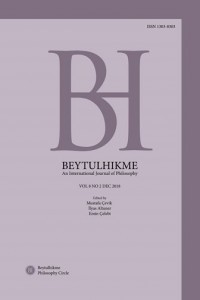Öz
Literature that can be found everywhere in Jacques Derrida’s writing forms the backbone of his whole corpus from democracy to law, from politics to ethics, from philosophy to art. He uses literature as a weapon against the domination of philosophy where main philosophical figures like Plato and Socrates who exclude literature had a share of this literary work. Many interpreters of Derrida sees him not a philosopher but a literary writer and this claims are both fair (from the traditional philosophical concept) and unfair (from the era where reaching the absolute is impossible). In this sense, recent years there have been various efforts to engage Jacques Derrida's conception of literature. In this work, because of literature is the "experience of singularity" for Derrida, we will try to deal with Derrida and literature relations through the singularity.
Anahtar Kelimeler
Kaynakça
- Atrridge, D. (2009). Giriş: Derrida ve Edebiyatın Sorgulanması. (Çev. A. Utku & M. Erkan). Edebiyat Edimleri. (Ed. D. Attridge), İstanbul: Otonom Yayınları, vii-xxxvii.
- Clark, T. (1992). Derrida, Heidegger, Blanchot: Sources of Derrida's Notion and Practice of Literature. Cambridge: Cambridge University Press.
- Clegg, S. & Rhodes, C. & Kornberger, M. (2015). Managers as Moral Subjects? Decision Making, Undecidability and the Organizational Ego. Last modified Jan 19. 2015. https://www.researchgate.net/publication/268411561.
- Culler, J. (2005). Derrida and the Singularity of Literature. Cardozo Law Review, 27 (2), 869-874.
- Derrida, J. (2007). Nietzsche’lerin Şöleni. (Çev. A. Utku & M. Erkan). İstanbul: Otonom Yayınları.
- Derrida, J. (2010). Edebiyat Edimleri. (Çev. A. Utku & M. Erkan). İstanbul: Otonom Yayınları.
- Derrida, J. (1981). Dissemination. (Trans. B. Johnson). Chicago: The University of Chicago Press.
- Derrida, J. (1996). Remarks on Deconstruction and Pragmatism. Deconstruction and Pragmatism. (Ed. C. Mouffe). London & New York: Routledge, 79-90.
- Gaston, S. (2007). Derrida and the History of Literature. Textual Practice, 21 (2), 313-334.
- Gehring, P. (2005). Force and “Mystical Foundation” of Law: How Jacques Derrida Addresses Legal Discourse. German Law Journal, 6 (1), 151-169.
- Ionescu, A. (2015). Spacing Literature between Mallarmé, Blanchot and Derrida. Parallax, 21 (1), 58-78.
- Kakoliris, G. (2017). ‘Kararverilemez Pharmakon’: Derrida’nın Phaidros Okuması. (Çev. S. E. Er). Yaşayan Platon. (Ed. S. E. Er & B. Akar). Konya: Çizgi Kitabevi.
- Raymond-Pickard, H. (2002). Derrida and Fidelity to History. History of European Ideas, 28 (1-2), 13-20.
- Robson, M. (2009). ‘A Literary Animal’: Rancière, Derrida and the Literature of Democracy, Parallax, 15 (3), 88-101.
- Utku, A. (2010). Her Şeyi Söyleme Hakkı: Jacques Derrida’da Edebiyat-Demokrasi Bağıntısı. Özgürlük, Eşitlik ve Kardeşlik Birinci Uluslararası Felsefe Kongresi. (Ed. İ. Serin). Bursa: Asa Kitabevi.
- Erkan, M. & Utku A. (2009). Sunuş: Jacques Derrida: Edebiyat Sahnesinde Tekillik Deneyimleri. Edebiyat Edimleri. (Ed. D. Attridge), İstanbul: Otonom Yayınları, vii-xxxvii.
- Yalım, B. (2017). Edebiyat ve Demokrasi. Last modified Dec 25, 2017.
Öz
Kaynakça
- Atrridge, D. (2009). Giriş: Derrida ve Edebiyatın Sorgulanması. (Çev. A. Utku & M. Erkan). Edebiyat Edimleri. (Ed. D. Attridge), İstanbul: Otonom Yayınları, vii-xxxvii.
- Clark, T. (1992). Derrida, Heidegger, Blanchot: Sources of Derrida's Notion and Practice of Literature. Cambridge: Cambridge University Press.
- Clegg, S. & Rhodes, C. & Kornberger, M. (2015). Managers as Moral Subjects? Decision Making, Undecidability and the Organizational Ego. Last modified Jan 19. 2015. https://www.researchgate.net/publication/268411561.
- Culler, J. (2005). Derrida and the Singularity of Literature. Cardozo Law Review, 27 (2), 869-874.
- Derrida, J. (2007). Nietzsche’lerin Şöleni. (Çev. A. Utku & M. Erkan). İstanbul: Otonom Yayınları.
- Derrida, J. (2010). Edebiyat Edimleri. (Çev. A. Utku & M. Erkan). İstanbul: Otonom Yayınları.
- Derrida, J. (1981). Dissemination. (Trans. B. Johnson). Chicago: The University of Chicago Press.
- Derrida, J. (1996). Remarks on Deconstruction and Pragmatism. Deconstruction and Pragmatism. (Ed. C. Mouffe). London & New York: Routledge, 79-90.
- Gaston, S. (2007). Derrida and the History of Literature. Textual Practice, 21 (2), 313-334.
- Gehring, P. (2005). Force and “Mystical Foundation” of Law: How Jacques Derrida Addresses Legal Discourse. German Law Journal, 6 (1), 151-169.
- Ionescu, A. (2015). Spacing Literature between Mallarmé, Blanchot and Derrida. Parallax, 21 (1), 58-78.
- Kakoliris, G. (2017). ‘Kararverilemez Pharmakon’: Derrida’nın Phaidros Okuması. (Çev. S. E. Er). Yaşayan Platon. (Ed. S. E. Er & B. Akar). Konya: Çizgi Kitabevi.
- Raymond-Pickard, H. (2002). Derrida and Fidelity to History. History of European Ideas, 28 (1-2), 13-20.
- Robson, M. (2009). ‘A Literary Animal’: Rancière, Derrida and the Literature of Democracy, Parallax, 15 (3), 88-101.
- Utku, A. (2010). Her Şeyi Söyleme Hakkı: Jacques Derrida’da Edebiyat-Demokrasi Bağıntısı. Özgürlük, Eşitlik ve Kardeşlik Birinci Uluslararası Felsefe Kongresi. (Ed. İ. Serin). Bursa: Asa Kitabevi.
- Erkan, M. & Utku A. (2009). Sunuş: Jacques Derrida: Edebiyat Sahnesinde Tekillik Deneyimleri. Edebiyat Edimleri. (Ed. D. Attridge), İstanbul: Otonom Yayınları, vii-xxxvii.
- Yalım, B. (2017). Edebiyat ve Demokrasi. Last modified Dec 25, 2017.
Ayrıntılar
| Birincil Dil | İngilizce |
|---|---|
| Konular | Felsefe |
| Bölüm | Makaleler |
| Yazarlar | |
| Yayımlanma Tarihi | 30 Aralık 2018 |
| Yayımlandığı Sayı | Yıl 2018 Cilt: 8 Sayı: 2 |

